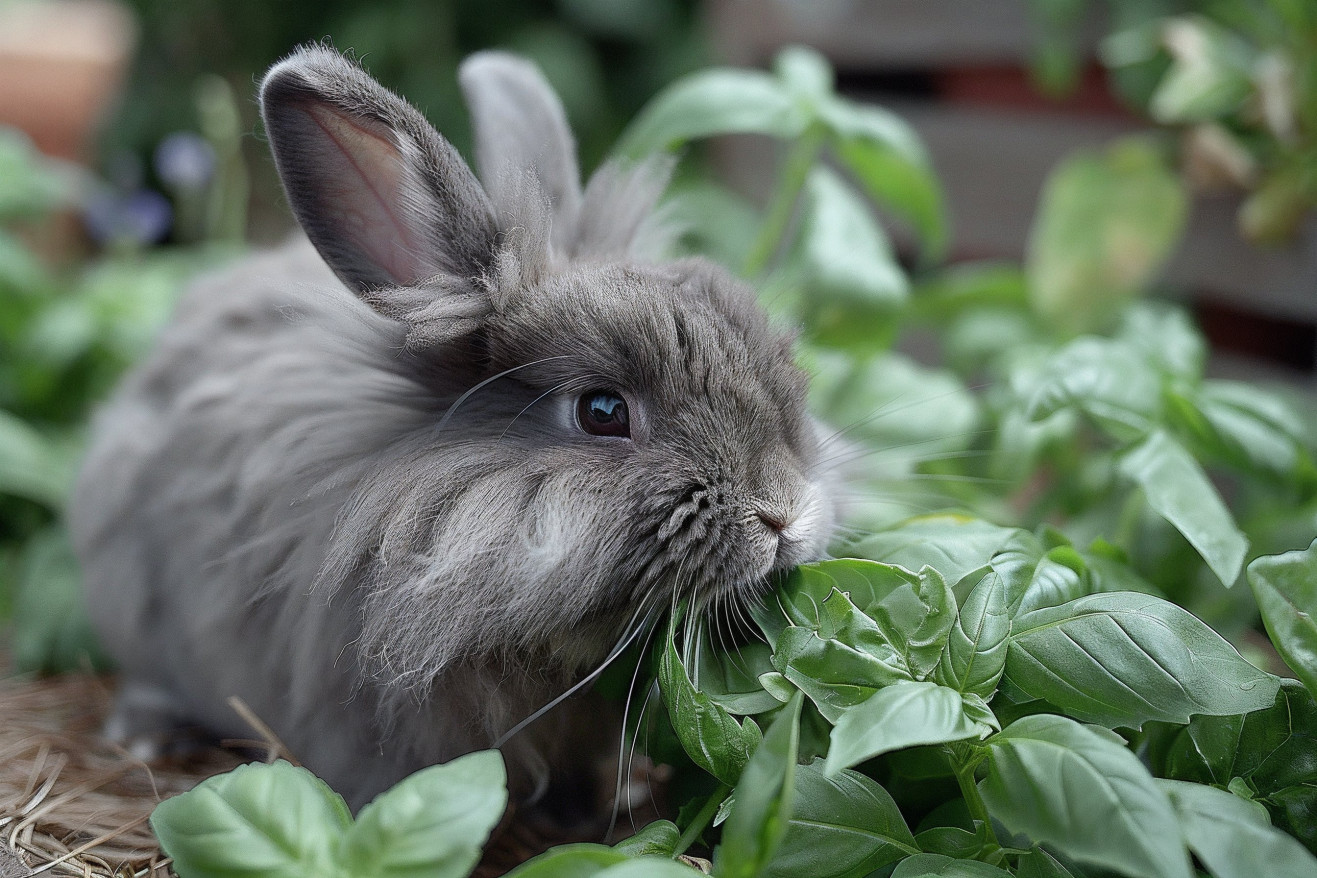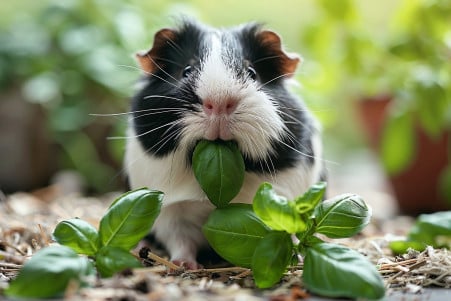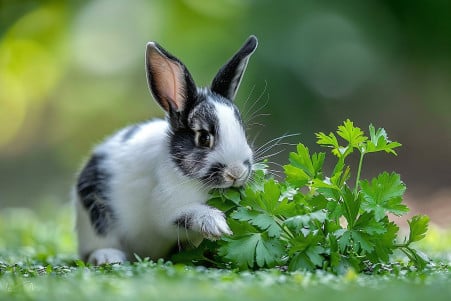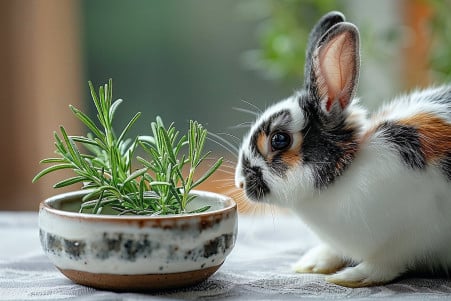Can Rabbits Eat Basil? Safe Feeding Practices and Benefits
16 February 2024 • Updated 14 February 2024

Basil’s fragrant aroma and tasty leaves may make you wonder if your rabbit can enjoy this herb as a snack. The good news is that rabbits can eat basil in moderation as long as it’s part of a well-rounded diet.
Basil has a number of important vitamins and minerals, but it’s important to remember that it’s a treat and should make up no more than 10% of the rabbit’s daily food consumption to prevent potential stomach upset.
In this article, we take a deep dive into the research to combine information from nutritional analyses, veterinary recommendations, and expert insights on caring for pet rabbits to help you better understand how basil can be incorporated into your rabbit’s diet.
This deep dive not only uncovers the health advantages of feeding basil but also the important considerations for protecting your rabbit’s health. By the end of this article, you’ll have the information you need to confidently and safely add some variety to your rabbit’s diet.
Can rabbits eat basil?
Basil’s Nutritional Profile and Rabbit Diet
Basil isn’t just a flavorful herb; it’s also a nutritious option for rabbits. According to Rabbit Care Tips, basil is rich in vitamins A, C, and K, and minerals such as potassium, magnesium, iron, and calcium. These nutrients are important for maintaining a rabbit’s overall health, supporting everything from eye and immune health to blood clotting and bone health.
That said, rabbits have specific dietary requirements that are very different from other animals, as explained by ScienceDirect Topics, which notes that rabbits need a diet that is low in protein and high in fiber.
Basil can be a good addition to a rabbit’s high-fiber diet when fed in moderation, as it can add variety without upsetting their sensitive digestive systems. In addition, studies have shown that herbs like basil have anti-inflammatory effects, which could offer additional benefits to your pet rabbit.
As a result, basil can be fed to rabbits as a delicious treat that can also support their health. Since rabbits are natural foragers, they will enjoy the addition of basil to their diet, not just for its taste but also for the environmental stimulation it provides, which can help promote natural behaviors and a more varied diet.
How to Safely Feed Basil to Your Rabbit
Like with any new food, when you first start feeding your rabbit basil, it’s important to do so in moderation. Rabbit Care Tips recommends feeding basil to your rabbit as a treat, making sure that it doesn’t make up more than 10% of your rabbit’s daily diet.
This way, your rabbit will still be eating enough hay, which is important for their fiber intake. Before feeding your rabbit basil, make sure to wash it thoroughly to remove any pesticides, especially if you aren’t feeding your rabbit organic basil.
As with any dietary change, it’s important to make sure that you introduce basil to your rabbit’s diet gradually. Both Small Pet Select and the PDSA stress the importance of this.
Start by giving your rabbit a small piece of basil and then watch them closely for a few days to see if they have any positive or negative reactions to it. If they don’t show any signs of digestive upset, you can gradually increase the amount of basil that you give them.
It’s important to pay attention to how your rabbit reacts to the basil. If you notice any changes in their behavior, appetite, or droppings, this could be a sign that they’re having a negative reaction to the basil.
Make sure that you continue to feed your rabbit a well-balanced diet that’s primarily made up of fresh hay, as the RSPCA recommends. However, by gradually introducing basil and other leafy greens, you can help improve your rabbit’s diet without negatively impacting their health.
Risks to Consider: When Basil Is Not Safe for Rabbits
Although basil can be a healthy snack for rabbits, it’s also important to know when it can be harmful. For example, the high calcium content in basil can be especially problematic for rabbits with kidney or urinary tract problems, according to Rabbit Care Tips. Too much calcium can make these problems worse and cause other health issues.
There’s also a risk of allergies or digestive issues. Some rabbits may have sensitivities to certain foods, which can cause symptoms like gas, bloating, and changes in bowel movements. If you notice any of these symptoms after feeding your rabbit basil, stop feeding it to them and see if their symptoms improve.
If your rabbit has eaten basil and is showing signs of discomfort and their symptoms don’t improve, contact your vet. It’s also important to note the study published in the Journal of Veterinary Science, which discusses the potential toxicity of herbal preparations in domestic animals, including rabbits.
While Thị Minh Thu Nguyễn’s research shows that basil in controlled amounts doesn’t affect rabbits’ hepatic functions, it’s still important to be cautious to avoid any potential side effects. This is something to keep in mind before you start feeding your rabbit basil on a regular basis.
Mix It Up: Adding More Herbs to Your Rabbit’s Diet
While basil is a great option for your rabbit, it’s important to mix things up to ensure a well-rounded diet. The Rabbit Welfare Association & Fund lists oregano, parsley, dill, cilantro, rosemary, and mint as other herbs that are safe for rabbits.
Each of these herbs has different nutritional properties; for example, oregano is an antioxidant, and parsley is high in vitamins C and K. Basil, on the other hand, is high in vitamins A and K, so it adds to the nutritional value of these other herbs.
By adding a variety of these safe herbs to your rabbit’s diet, you can make sure they’re getting a range of nutrients while also keeping their meals interesting. Small Pet Select explains that herbs are full of vitamins and trace minerals that are good for digestion and overall health.
Plus, adding a variety of herbs to your rabbit’s diet can help them engage in their natural foraging behavior, which is important for their mental and physical health.
By rotating through different herbs, including basil, you can make sure that your rabbit stays engaged and continues to forage. Not only will this make their diet more interesting, but it will also make their meals more stimulating and fun, providing a well-rounded experience.
Final Thoughts: Can Rabbits Eat Basil?
To wrap up, we can now confirm that rabbits can eat basil as part of a healthy, balanced diet. However, as recommended, it should be fed in moderation, making up no more than 10% of a rabbit’s daily food allowance, so that rabbits still eat enough hay to meet their fiber needs, which the RSPCA highlights.
While basil does offer a number of nutrients, such as vitamins A, C, and K, and important minerals, it’s also important to remember to introduce it to your rabbit’s diet slowly and watch out for any signs of intolerance.
It’s important to be a conscientious rabbit owner and to be mindful of your rabbit’s diet and health. From choosing organic basil to avoid pesticides to being aware of the potential dangers of its calcium content, it’s important that pet parents always prioritize the health and safety of their pets.
Let’s appreciate the way that herbs like basil can help to make rabbits’ diets more interesting and nutritious. By following these tips, you can feel good about adding to your rabbit’s diet while supporting their overall well-being.


